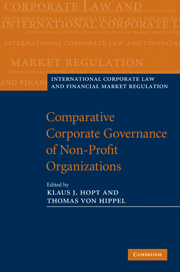Book contents
- Frontmatter
- Contents
- List of contributors
- Preface
- Abbreviations
- PART I Economic findings and theories on nonprofit organizations
- PART II The nonprofit sector: private law, trust law, tax law in selected countries
- PART III The board of nonprofit organizations
- PART IV Good governance of nonprofit organizations: activities and regulatory problems
- 10 Fundraising
- 11 Asset management in nonprofit organizations
- 12 Nonprofit organizations and economic activities/enterprises
- 12.1 Nonprofit organizations and economic activities/enterprises
- 12.2 Nonprofit organizations and enterprises: the Danish foundation law as an example
- 12.3 The protection of members and creditors of nonprofit organisations
- PART V Good governance of nonprofit organizations: self-regulation, disclosure and supervision
- Index
- References
12.2 - Nonprofit organizations and enterprises: the Danish foundation law as an example
from 12 - Nonprofit organizations and economic activities/enterprises
Published online by Cambridge University Press: 05 August 2011
- Frontmatter
- Contents
- List of contributors
- Preface
- Abbreviations
- PART I Economic findings and theories on nonprofit organizations
- PART II The nonprofit sector: private law, trust law, tax law in selected countries
- PART III The board of nonprofit organizations
- PART IV Good governance of nonprofit organizations: activities and regulatory problems
- 10 Fundraising
- 11 Asset management in nonprofit organizations
- 12 Nonprofit organizations and economic activities/enterprises
- 12.1 Nonprofit organizations and economic activities/enterprises
- 12.2 Nonprofit organizations and enterprises: the Danish foundation law as an example
- 12.3 The protection of members and creditors of nonprofit organisations
- PART V Good governance of nonprofit organizations: self-regulation, disclosure and supervision
- Index
- References
Summary
Outline of Danish law on foundations
General principles for nonprofit organizations in Danish law
In Danish law, the general principles that govern nonprofit organizations are basically identical to those used in Sweden (see the contribution by Hemström). Thus, under Danish law a founder may generally decide that a nonprofit activity shall be conducted within the framework of a foundation, a limited liability company, an association, or yet another type of legal vehicle. If an association takes up economic activities of a nonprofit character which are not of a minor scale compared to the overall activities of that association, the association gains enterprise status under the Act on Business Enterprises. This has a number of consequences. Most importantly, the association must be registered in order to have status as a separate legal entity, and the association must prepare annual accounts, subject to audit, under the same rules that apply to limited liability companies.
The first Danish Act on Public Limited Companies (in Danish aktieselskaber) of 1917 did not allow public companies to be used for nonprofit purposes. A public limited company could, however, be used as a legal framework for charitable activities, provided the shareholders of that company were entitled to an interest from the capital invested plus a minimal dividend of the company's income. The Danish 1973 Companies Act introduced a provision to this effect (§ 1 (5)), but since the adoption of the 1985 Foundations Acts, this provision has been deleted.
- Type
- Chapter
- Information
- Comparative Corporate Governance of Non-Profit Organizations , pp. 770 - 788Publisher: Cambridge University PressPrint publication year: 2010



